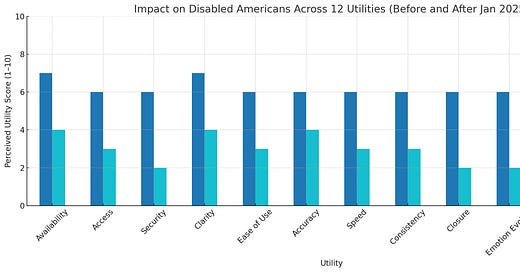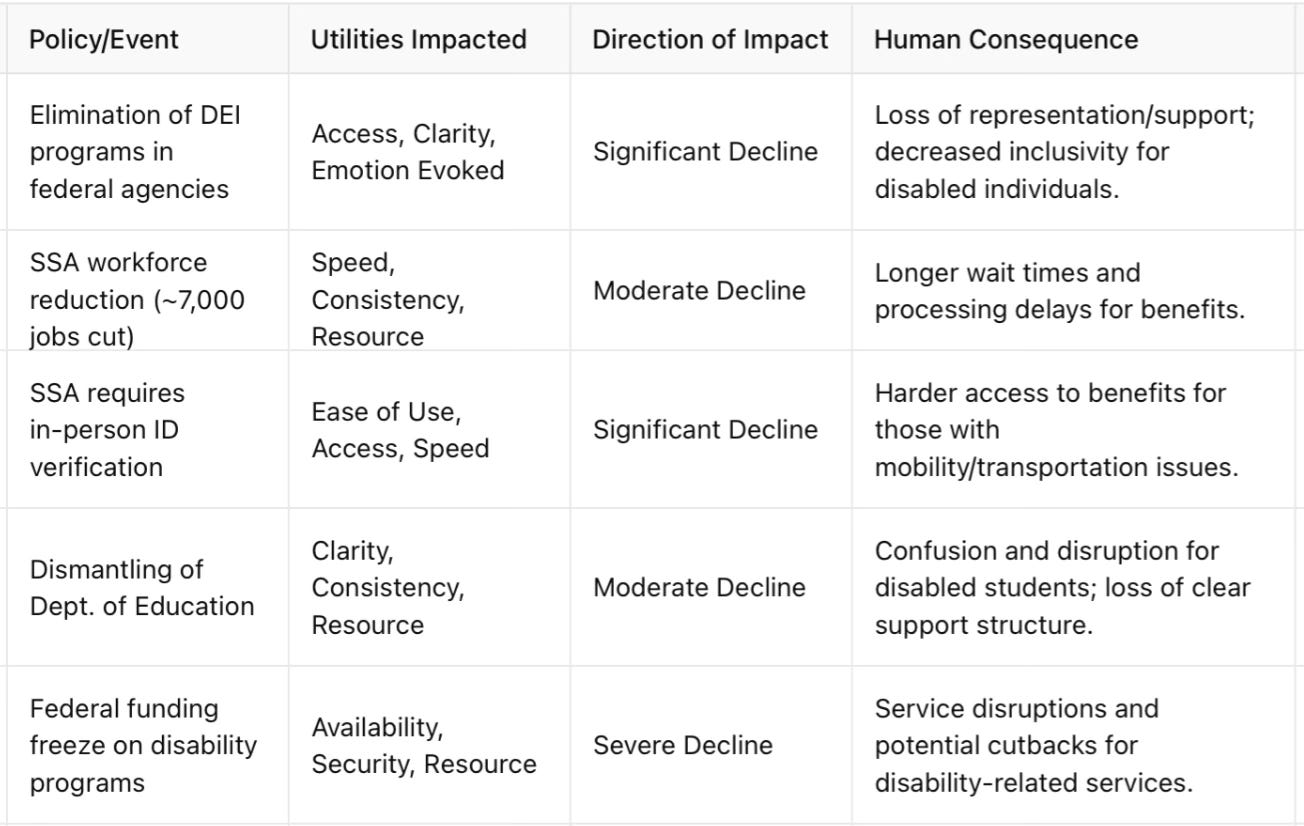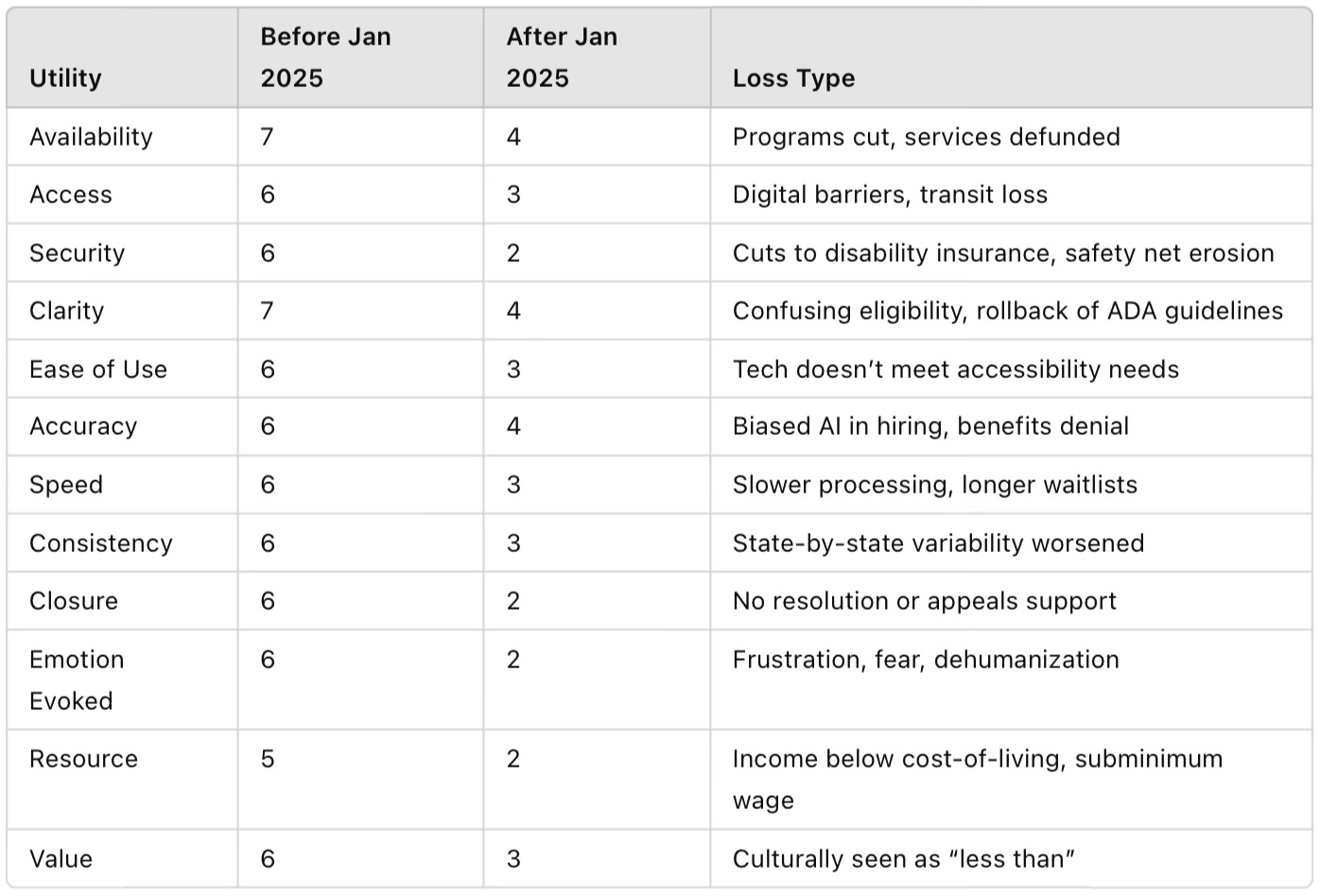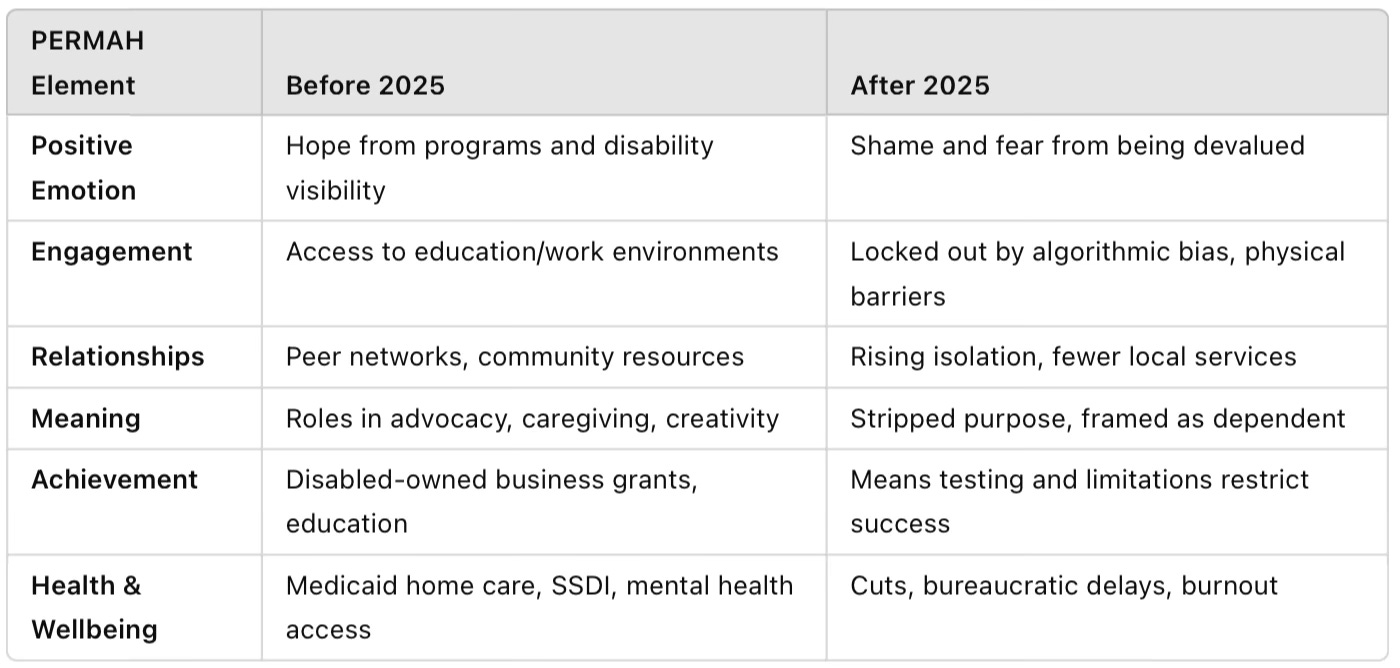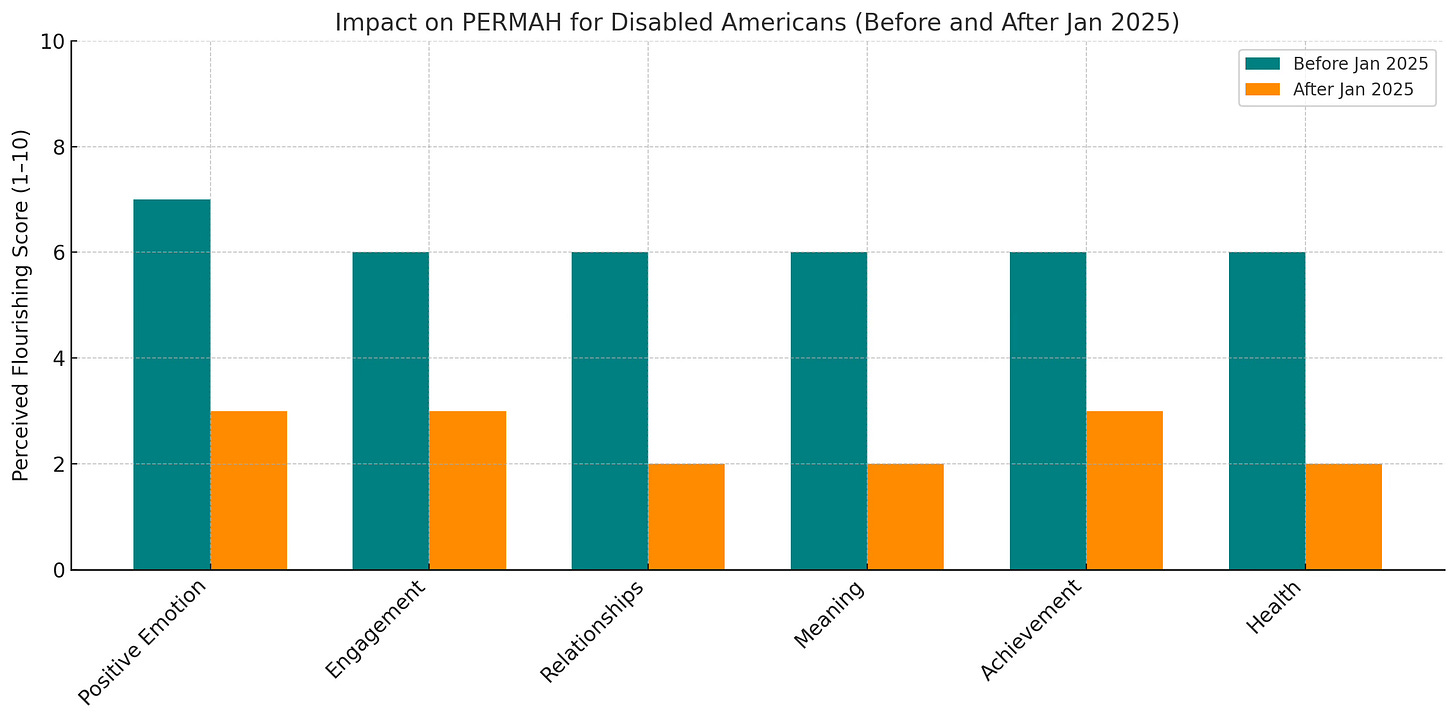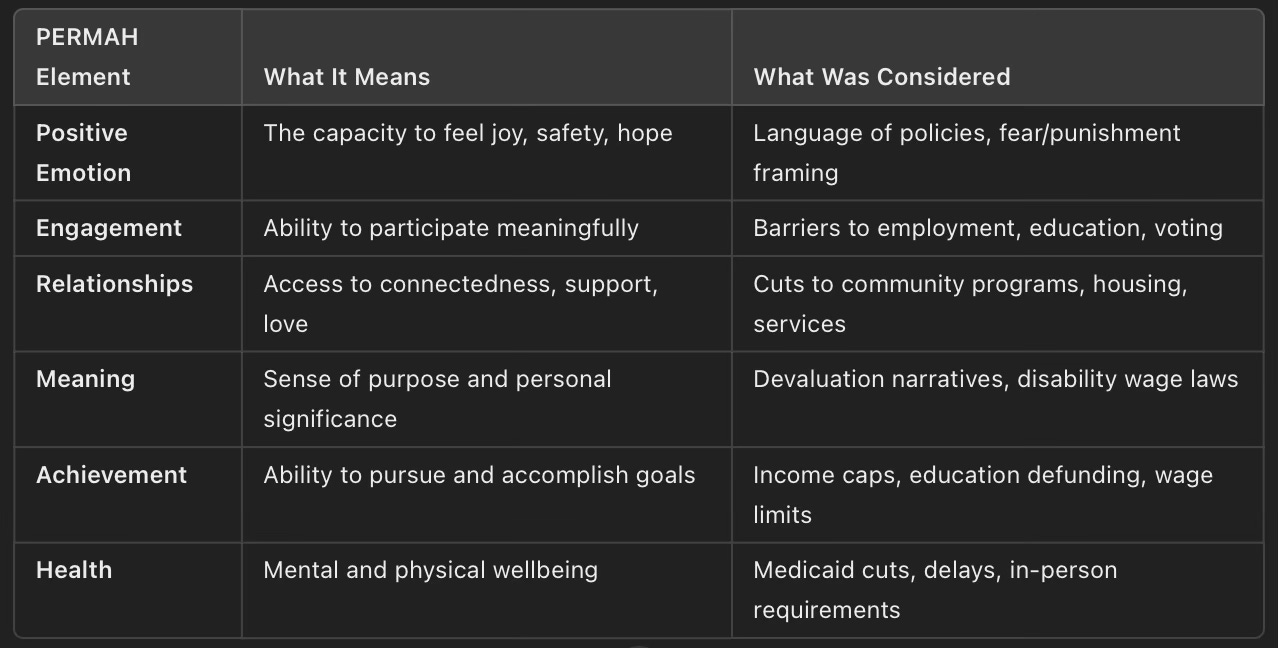From the THX Series Hub: Government That Works and FromTHX Series Hub: Disability, Autism & THX
The Deepening Gap Between Disabled and Able-Bodied America — and What It Reveals About Us All
Before Trump took office in January 2025, the arc of disability rights, while imperfect, pointed toward greater inclusion. From the Americans with Disabilities Act to Medicaid expansion and growing digital accessibility standards, there was momentum—even if slow—toward equity.
After January 2025, that progress began to reverse. Rapidly.
The Utility Collapse: A Chart of What’s Been Lost
In the THX framework, we use 12 core Utility categories to evaluate lived experience: from Access and Security to Closure and Value. These scores below reflect how disabled people experienced the world before Trump took office—and how things have changed since.
Let’s dig deeper into what this means across key THX frameworks.
The 12 Utilities: A Human Experience Breakdown
Grounded in Real-World Examples and Sentiment
While the scores are illustrative, they’re anchored in real patterns:
How These Scores Were Created
These scores aren’t just numbers—they're a synthesis of real-world shifts, based on:
The 12 Utilities Model: We used THX’s utility framework to assess how key areas of life—like access to healthcare, the clarity of systems, or the emotional tone of public services—functioned before and after January 2025.
Prospect Theory: In behavioral economics, losses hurt more than equivalent gains help. So when disabled individuals lost programs or protections, the emotional and practical impact was steep. A drop from 6 to 3 on the “Access” scale might feel like a cliff-edge plunge, not a mere step down.
Lived Experience + Policy Trends: These scores reflect:
Rollbacks in Medicaid, DEI programs, and ADA enforcement.
Rise in subminimum wage justifications.
Erosion of digital accessibility standards, appeals processes, and caregiver support systems.
Increased stigma and policy framing that positions disabled people as economic burdens rather than citizens with equal value.
Not Meant to Be Abstract: These scores could be refined further through community surveys or interviews, but they reflect a real and felt shift in how much dignity, ease, and safety people experience across the 12 dimensions of life.
Prospect Theory in Action: Why These Losses Loom Larger
Prospect Theory teaches us that losses hit harder than gains feel good. For disabled Americans, many of these changes weren't just drops—they were drops from a barely-adequate baseline.
When you already lived on the edge of access and security, even a small cut can feel catastrophic.
Losses to things like access and security aren’t just practical. They’re deeply emotional. They signal that your worth in society has been recalibrated downward.
Mental Accounting and Compounding Losses
In THX, we know that people evaluate their lives like a balance sheet—weighing losses and gains in separate “mental accounts.” For many disabled Americans, nearly every utility category has trended downward.
And unlike other groups, there’s often no “offsetting gain.” For example:
Losing access to transportation or caregiver support isn’t “balanced” by a tax cut.
Being told you're no longer eligible for full-time work accommodations isn't remedied by a “choice” to go remote.
PERMAH Fractures: The Human Cost Beyond the Numbers
PERMAH is a positive psychology framework of six endeavors humans strive for, for their own sake. The chart above shows how disabled people have experienced a systematic erosion of each element since January 2025. While PERMAH typically tracks what helps humans flourish, here it highlights what has been denied: the chance to feel joy without fear, to participate fully, to be seen as valuable, to grow, and to be well. Under current policies, the fundamental building blocks of human dignity are no longer accessible to many disabled Americans—not because of their disabilities, but because of deliberate decisions.
This isn't just an economic collapse. It's a collapse of dignity.
Methodology: How the PERMAH Scores Were Estimated
These ratings are not from a single dataset but instead a synthesis of policy analysis, human impact narratives, and behavioral frameworks. They’re rooted in the THX approach to measuring transformation—not only what changed, but how deeply those changes were felt.
1. Definition-Based Analysis
Each PERMAH element was rated based on how recent policies have affected people's ability to achieve or experience it:
2. Scoring Approach
Each PERMAH element was rated on a 1–10 scale, where:
Pre-2025: Scores were in the 6–7 range (modest, but growing inclusion efforts).
Post-2025: Scores dropped by 3–5 points based on the severity of systemic loss and compounding barriers.
3. Cross-Referenced With Utility Impact
The chart pairs with the 12 Utilities impact grid—since losses in Access, Security, Resource, and Emotion Evoked directly map to PERMAH losses. For example:
Losing Access to transportation or care → lowers Engagement.
Policies reducing Resource utility (like food or wage support) → damage Health, Achievement, and Positive Emotion.
4. Grounded in Human Consequences
Each drop was aligned with real human stories and projected consequences:
A blind student losing screen-reader access → loss in Engagement and Achievement.
A disabled worker paid $3.50/hour under 14(c) → drop in Meaning, Value, and Positive Emotion.
A chronically ill person losing Medicaid hours → hit to Health and Closure.
Admiration Reversed: The End of Being Seen
In the Admiration Equation, we know people feel awe or gratitude when they see others showing courage, kindness, or excellence. But since 2025, disabled people have been portrayed not as brave or skillful—but as costly, suspect, or inconvenient.
The result?
Less admiration.
More bureaucratic cruelty.
A fading societal willingness to even see disabled individuals.
Your Challenge: What Utility Have You Taken for Granted?
If you are able-bodied, consider:
Would you tolerate being told you’re not worth minimum wage?
Could you function if your access to transportation, medication, or communication was conditional?
What if every time you sought help, the system was designed to confuse, delay, or doubt you?
Which of the 12 utilities have you never had to think about—because they’ve never been denied to you?
Why This Matters to All of Us
The THX movement isn’t just about customer experiences. It’s about transformational human experiences—and what it means to belong, to matter, and to be protected.
If you’ve never lived with a disability, this post isn’t meant to guilt you.
It’s meant to invite you to stand in solidarity, use your voice, and help rebuild dignity where it’s been stripped away.

